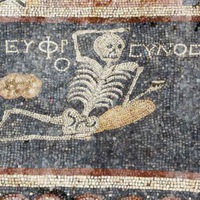А вот вам пост про бытовое литературоведение с применением современных технологий. Я не знаю, помнит ли здесь кто-то из тех, кто видел меня с гитарой хоть раз, эти строчки:
«А я буду верен любимой своей, если она не бросит меня.»
Для тех, кто не помнит: эту песню-подражание ирландским застольным балладам за авторством Лоры Бочаровой я имела обыкновение исполнять под гитару в больших компаниях. Там надо в припеве хором повторять «Пой, Томми, пой», поэтому очень удачно для сборищ. Игорь, надо сказать, оказался из тех, кто запомнил. В один прекрасный вечер он вдруг принес мне цитату из Честертона, которого он, значит, решил почитать на досуге. Эссе называется «Хор», а цитата вот:
«...Но мне хотелось бы, чтобы хоть изредка вступал хор. Мне бы хотелось, чтобы после мучительной, как агония, нездоровой до жути главы врывался голос человеческий и орал читателю, да и писателю, что это еще не все. Упивайтесь жестокостью и сомнением, только бы вовремя звенел припев.
Например, мы читаем: «Гонория бросила томик Ибсена и тяжело побрела к окну. Она ясно поняла теперь, что ее жизнь не только сложней, но и холодней и неприютней, чем жизнь бескрылых мещан. И тра-ля-ля-ля!»
Или: «Молодой священник горько усмехнулся последним словам прабабушки. Он знал слишком хорошо, что с тех пор, как Фогт установил закон наследственной косматости козлов, религиозная этика строится на совершенно новых основаниях. И о-го-го-го-го!»
Или так: «Юриэль Мэйблум мрачно смотрел на свои сандалии. Он понял наконец, как бессмысленны и бесчеловечны путы, связывающие мужчину и женщину; понял, что каждый из них должен идти своей дорогой, не пытаясь перекинуть мост через бездну, разделяющую души». И тут ворвется оглушительный хор бессмертного человечества: «А я буду верен любимой моей, если не бросит меня».»
Хорошая цитата. А Игорь меж тем говорит: «Смотри, тут последняя прямо из песни строчка. Это, наверное, она ее из Честертона взяла.» Лора – в ирландскую балладу – строчку из христианского прозаика Честертона? Да ладно! Скорее уж Честертон ее взял из ирландской баллады. А Лора? А Лора тоже из баллады, они оба взяли ее, а переводчик был правильный, и там, и сям (и в балладе, и в Честертоне) перевел правильно. Короче, кто его знает. И все же?
В поисках ответа на свой вопрос я лениво перерыла Интернет в течение двух дней. Баллада оказалась шотландской и про двух сестер, Честертон скорее всего оттуда и взял эту строчку. Откуда взяла ее Лора, оставалось непонятным. Тут в голову пришла одна из тех мыслей, про которые потом думаешь, а почему же они не пришли туда с самого начала: надо написать Лоре и спросить у нее самой. Нет, мы не знакомы. Но оказалось, что разделяет нас лишь одно рукопожатие и что у нее есть вконтакт, куда я и написала. «Ну, конечно, это Честертон!» – сказала Лора, и история на этом заканчивается.
Мораль: люблю Интернет. Жалко, что у Пушкина нельзя спросить, как он относится к тому, что он – «наше все», у Шекспира – был ли он женщиной, а у Ленина спросить, был ли он грибом.
«А я буду верен любимой своей, если она не бросит меня.»
Для тех, кто не помнит: эту песню-подражание ирландским застольным балладам за авторством Лоры Бочаровой я имела обыкновение исполнять под гитару в больших компаниях. Там надо в припеве хором повторять «Пой, Томми, пой», поэтому очень удачно для сборищ. Игорь, надо сказать, оказался из тех, кто запомнил. В один прекрасный вечер он вдруг принес мне цитату из Честертона, которого он, значит, решил почитать на досуге. Эссе называется «Хор», а цитата вот:
«...Но мне хотелось бы, чтобы хоть изредка вступал хор. Мне бы хотелось, чтобы после мучительной, как агония, нездоровой до жути главы врывался голос человеческий и орал читателю, да и писателю, что это еще не все. Упивайтесь жестокостью и сомнением, только бы вовремя звенел припев.
Например, мы читаем: «Гонория бросила томик Ибсена и тяжело побрела к окну. Она ясно поняла теперь, что ее жизнь не только сложней, но и холодней и неприютней, чем жизнь бескрылых мещан. И тра-ля-ля-ля!»
Или: «Молодой священник горько усмехнулся последним словам прабабушки. Он знал слишком хорошо, что с тех пор, как Фогт установил закон наследственной косматости козлов, религиозная этика строится на совершенно новых основаниях. И о-го-го-го-го!»
Или так: «Юриэль Мэйблум мрачно смотрел на свои сандалии. Он понял наконец, как бессмысленны и бесчеловечны путы, связывающие мужчину и женщину; понял, что каждый из них должен идти своей дорогой, не пытаясь перекинуть мост через бездну, разделяющую души». И тут ворвется оглушительный хор бессмертного человечества: «А я буду верен любимой моей, если не бросит меня».»
Хорошая цитата. А Игорь меж тем говорит: «Смотри, тут последняя прямо из песни строчка. Это, наверное, она ее из Честертона взяла.» Лора – в ирландскую балладу – строчку из христианского прозаика Честертона? Да ладно! Скорее уж Честертон ее взял из ирландской баллады. А Лора? А Лора тоже из баллады, они оба взяли ее, а переводчик был правильный, и там, и сям (и в балладе, и в Честертоне) перевел правильно. Короче, кто его знает. И все же?
В поисках ответа на свой вопрос я лениво перерыла Интернет в течение двух дней. Баллада оказалась шотландской и про двух сестер, Честертон скорее всего оттуда и взял эту строчку. Откуда взяла ее Лора, оставалось непонятным. Тут в голову пришла одна из тех мыслей, про которые потом думаешь, а почему же они не пришли туда с самого начала: надо написать Лоре и спросить у нее самой. Нет, мы не знакомы. Но оказалось, что разделяет нас лишь одно рукопожатие и что у нее есть вконтакт, куда я и написала. «Ну, конечно, это Честертон!» – сказала Лора, и история на этом заканчивается.
Мораль: люблю Интернет. Жалко, что у Пушкина нельзя спросить, как он относится к тому, что он – «наше все», у Шекспира – был ли он женщиной, а у Ленина спросить, был ли он грибом.
And here is a post about everyday literature using modern technologies. I don’t know if any of those who have ever seen me with a guitar here remember these lines:
"And I will be faithful to his beloved, if she does not leave me."
For those who do not remember: this song is an imitation of the Irish table ballads by Laura Bocharova, I used to play the guitar in large companies. There you have to repeat “Sing, Tommy, Sing” in the chorus in the chorus, therefore it is very good for gatherings. Igor, I must say, was one of those who remembered. One fine evening, he suddenly brought me a quote from Chesterton, which he, therefore, decided to read at his leisure. The essay is called "Choir", and the quote is:
“... But I would like the choir to enter at least occasionally. I would like to see, after an agonizing, agonizing, unhealthy before the horror of a chapter, a human voice would burst in and scream to the reader, and the writer, that this is not all. Revel in cruelty and doubt, if only the chorus would ring in time.
For example, we read: “Honoria threw a volume of Ibsen and walked heavily to the window. She now clearly understood that her life was not only more complicated, but also colder and more unpleasant, than the life of wingless burghers. And tra la la la la! ”
Or: “The young priest smiled bitterly at the last words of his great-grandmother. He knew all too well that since Vogt established the law of hereditary katmat, religious ethics have been built on entirely new foundations. And ohhhhhhhhhh! ”
Or like this: “Yuriel Mayblum gloomily looked at his sandals. He finally realized how senseless and inhuman the bonds that bind a man and a woman are senseless; I realized that each of them should go his own way, not trying to build a bridge over the abyss that separates souls. ” And then the deafening chorus of immortal humanity will burst: "And I will be faithful to my beloved, if you do not leave me."
Good quote. Meanwhile, Igor says: “Look, here is the last straight line from the song. She probably took her from Chesterton. ”Laura - in the Irish ballad - a line from the Christian writer Chesterton? Come on! Rather, Chesterton took it from an Irish ballad. And Laura? And Laura is also from a ballad, they both took it, and the translator was correct, and there and there (and in the ballad, and in Chesterton) translated correctly. In short, who knows. But still?
In search of an answer to my question, I lazily searched through the Internet for two days. The ballad turned out to be Scottish and about two sisters, Chesterton most likely from there and took this line. From where Laura took it, remained incomprehensible. Then one of those thoughts came up to my mind, about which then you think, and why they didn’t come there from the very beginning: you need to write to Laura and ask her herself. No we are not familiar. But it turned out that only one handshake separates us and that she has VKontakte, where I wrote. “Well, of course, this is Chesterton!” Said Laura, and the story ends there.
Moral: I love the Internet. It is a pity that Pushkin cannot be asked how he feels about the fact that he is “our everything”, for Shakespeare whether he had a woman and Lenin to ask if he had a mushroom.
"And I will be faithful to his beloved, if she does not leave me."
For those who do not remember: this song is an imitation of the Irish table ballads by Laura Bocharova, I used to play the guitar in large companies. There you have to repeat “Sing, Tommy, Sing” in the chorus in the chorus, therefore it is very good for gatherings. Igor, I must say, was one of those who remembered. One fine evening, he suddenly brought me a quote from Chesterton, which he, therefore, decided to read at his leisure. The essay is called "Choir", and the quote is:
“... But I would like the choir to enter at least occasionally. I would like to see, after an agonizing, agonizing, unhealthy before the horror of a chapter, a human voice would burst in and scream to the reader, and the writer, that this is not all. Revel in cruelty and doubt, if only the chorus would ring in time.
For example, we read: “Honoria threw a volume of Ibsen and walked heavily to the window. She now clearly understood that her life was not only more complicated, but also colder and more unpleasant, than the life of wingless burghers. And tra la la la la! ”
Or: “The young priest smiled bitterly at the last words of his great-grandmother. He knew all too well that since Vogt established the law of hereditary katmat, religious ethics have been built on entirely new foundations. And ohhhhhhhhhh! ”
Or like this: “Yuriel Mayblum gloomily looked at his sandals. He finally realized how senseless and inhuman the bonds that bind a man and a woman are senseless; I realized that each of them should go his own way, not trying to build a bridge over the abyss that separates souls. ” And then the deafening chorus of immortal humanity will burst: "And I will be faithful to my beloved, if you do not leave me."
Good quote. Meanwhile, Igor says: “Look, here is the last straight line from the song. She probably took her from Chesterton. ”Laura - in the Irish ballad - a line from the Christian writer Chesterton? Come on! Rather, Chesterton took it from an Irish ballad. And Laura? And Laura is also from a ballad, they both took it, and the translator was correct, and there and there (and in the ballad, and in Chesterton) translated correctly. In short, who knows. But still?
In search of an answer to my question, I lazily searched through the Internet for two days. The ballad turned out to be Scottish and about two sisters, Chesterton most likely from there and took this line. From where Laura took it, remained incomprehensible. Then one of those thoughts came up to my mind, about which then you think, and why they didn’t come there from the very beginning: you need to write to Laura and ask her herself. No we are not familiar. But it turned out that only one handshake separates us and that she has VKontakte, where I wrote. “Well, of course, this is Chesterton!” Said Laura, and the story ends there.
Moral: I love the Internet. It is a pity that Pushkin cannot be asked how he feels about the fact that he is “our everything”, for Shakespeare whether he had a woman and Lenin to ask if he had a mushroom.
У записи 27 лайков,
2 репостов.
2 репостов.
Эту запись оставил(а) на своей стене Полина Оскольская














































